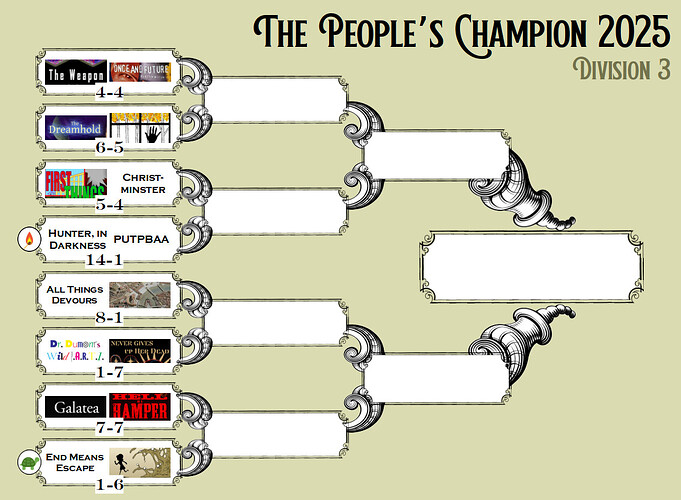Here are some interesting matchups!
The Weapon vs Once and Future
‘The Weapon’ is a solid one-room sci-fi game. It was included in a lot of game packs, including the Frotz app on iPhone. Once and Future, on the other hand, is a long and complex game that was once commercial. Both have heavy themes of war. Once and Future belongs to an era where games were designed to be long, filled with puzzles designed to take a long time to figure out. The Weapon is designed to be solved quickly, and focuses more on polish and character dynamics than overall length.
The Dreamhold vs What Heart Heard Of, Ghost Guessed
The Dreamhold was one of two games by famous IF authors designed to be long, complex tutorial games (the other being Bronze by Emily Short). It has an excellent dark atmosphere and a lot of symbolism. What Heart Heard of, Ghost Guessed is shorter (but still fairly hefty) and has a great interaction style (using a limited parser based on emotions). I see their themes as ‘hubris’ and ‘transgression’ respectively (but both have a lot of different interpretations so this is in no way canonical). Dreamhold has a long history, is well-known and has one of the most famous authors, while ‘Ghost Guessed’ has won numerous awards including Best Game and is still highly present in public consciousness.
First Things First vs Christminster
This is the war of ‘Somewhat older polished parser game that is long and well-written and a staple of the community’. First Things First is often cited as one of the best time travel games (although, as some have noted, the opening puzzles are a little more dull before the fun later parts). Christminster was one of the ‘big 3’ Inform games released in the two years after Curses, along with Theatre and Jigsaw. It features academic mystery and was, in my opinion, ahead of its time. These both appeal to similar demographics, so it’ll be an interesting match.
Hunter, in Darkness vs Pick Up the Phone Booth and Aisle
It’s funny that two ‘reference’ games got picked to go against each other. Hunter, in Darkness is a Hunt the Wumpus remake/upgrade, while PUTPBAA references both Aisle and Pick Up the Phone Boot and Die.
Otherwise, they’re pretty different. Hunter, in Darkness is what I once referred to as a ‘linear thriller’ game in an IFDB list, a parser game with quick action and puzzles that are designed to be solved relatively quickly to give momentum to the story.
PUTPBAA is a silly, goofy game with many endings. After finding a few yourself, it could be worthwhile looking at the guide. There’s not much coherency at all, just a wild mishmash of ideas.
All Things Devours is the other time travel game frequently cited by IF fans, bs Golden Heist, a funny and interesting alternate history choice-based heist game.
All Thing Devours focuses heavily on a single puzzle concept, which is avoiding paradoxes. It’s pretty compact, but figuring out how to avoid every mistake is a process of trial and error.
The Golden Heist is more of a romp, easier to get through but with some more puzzles than usual in choice-based games.
Dr Dumont’s Wild P.A.R.T.I. vs Never Gives Up Her Dead
I wrote the second one, so take what I say with a grain of salt. Both of these games are ones which were never entered in major competitions. 'Dr Dumont’s Wild PARTI" was written by an Infocom implementor and intended for release first by Infocom and then by Cascade Mountain publishing. It’s a series of abstract puzzles that symbolize you finding a new quantum particle, and has a hub-and-spoke nature where you teleport into the new areas.
My game also has a hub-and-spoke nature where you teleport into new areas! It’s a crashing ship where portals have opened to places like a haunted house and a zoo.
Both games can be pretty long. Since each has mostly self-contained areas (though you have to trek back and forth at least a little for each area), there’s a good likelihood players will only see one or two. I’d recommend the north area for Dr Dumont (it’s where the main storyline really starts) and the Train area in my game (found on the Bridge).
Galatea vs To Hell in a Hamper
Galatea is to Emily Short as Creep is to Radiohead, an early work that isn’t fully representative of their later successful career but is popular enough that it remains the most iconic work in the eyes of the public. It’s one of the most complex NPCs ever made, with dozens of endings. It’s a serious game.
To Hell in a Hamper is a very goofy game, and a very funny one. Like Galatea, it’s a one-room game focused on interacting with an individual. The difference is that here, you’re in a balloon with a kleptomaniac hoarder, and you have to throw everything they’ve hoarded out of the basket before you both die.
Both are fantastic games. Everyone’s a winner for getting to try both.
The End Means Escape vs Brain Guzzlers from Beyond
The End Means Escape is a bizarre game, a sequence of unusual interactions that really tests the limits of what interactive fiction can do. It includes things like a room where all items can talk, a room where people are frozen in time and every body part is individuall modelled, like fingers; a room where descriptions can be taken apart word by word and manipulated.
Brain Guzzler’s from Beyond is a popular straightforward comedy that relies on good writing and fun, simple puzzles. It’s written in a breathless 1950’s pulp sci fi style and features alien invaders that must be stopped at all costs.
A lot of good games here today! I already knew what I was going to vote on for all of these (except my own, of course). Interested to see what others think!
